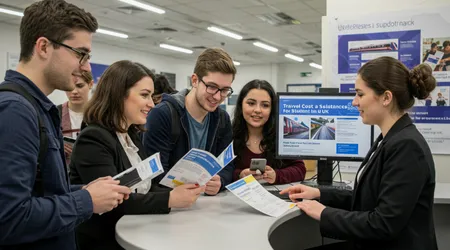Travel Costs Assistance for Students in the UK

For university students across the UK, the true cost of education extends far beyond tuition and accommodation fees. Daily commuting, essential field placements, and necessary trips home can quickly drain tight budgets.
The often-overlooked reality is that securing Travel Costs Assistance for Students in the UK is a crucial, yet complex, component of financial survival.
Misunderstanding the myriad of grants, discounts, and bursaries available leaves countless students footing excessive bills.
This article, grounded in current 2025 financial aid structures, serves as a vital guide. We dissect the specific avenues of support, differentiating between government schemes and institutional funds.
Discover how strategic planning can transform travel expenses from a burden into a manageable part of your academic investment. Knowledge is power, especially when navigating student finance.
The Government Safety Net: Statutory Funding and Specialized Grants
While UK student finance bodies primarily cover tuition and maintenance, they also operate key, often means-tested, grants specifically targeting travel burdens. These mechanisms aim to ensure geographic distance doesn’t become a barrier to education.
Disabled Students’ Allowance (DSA) and Travel
The Disabled Students’ Allowance (DSA) is a crucial lifeline. It provides non-means-tested funding for costs arising directly from a disability, including significant travel expenses. This is particularly relevant for students unable to use public transport.
DSA can cover taxi fares, specialized transport, or even the costs of a necessary support worker’s travel. Students must have their travel needs assessed and linked directly to their disability by the relevant student finance body.
It’s a key source of Travel Costs Assistance for Students in the UK that often covers substantial ongoing expenses.
This allowance is assessed based on need, not income, making it a reliable resource. Successfully claiming DSA requires detailed evidence from medical professionals and an assessment of need.
++ Benefits of remote working in the UK: Home Office, Allowance and Travel Allowances
Clinical and Field Placement Travel Costs
For students in vocational courses like Nursing, Midwifery, or Teaching, mandatory placements often require travel far beyond the university campus. The NHS and relevant education bodies manage specialized schemes for this.
In England, the NHS Learning Support Fund (LSF) includes an allowance for excess travel costs incurred while attending placements. This covers mileage or public transport costs above the student’s normal daily commute.
Similarly, specific teaching bursaries may incorporate travel assistance for school placements. This targeted support is vital; without it, many placement-heavy degrees would be financially prohibitive.
Students must meticulously track all mileage and retain all public transport receipts. The application process is detailed, requiring precise documentation to prove the necessity of the extra distance traveled for clinical or field duties.

Institutional Support: Bursaries and Hardship Funds
Beyond the national government schemes, universities themselves hold significant financial power. Their internal funding mechanisms are flexible, often less bureaucratic, and represent a major source of Travel Costs Assistance for Students in the UK.
Also read: NHS Reforms: What Citizens Need to Know
The Discretionary Hardship Fund
Every UK university maintains a Discretionary Hardship Fund (DHF), often referred to as the “Welfare Fund.” These funds exist to provide financial relief to students facing unforeseen or exceptional difficulties.
Travel is a common category for DHF claims, particularly for students who need to make emergency trips home due to family illness or bereavement. They can also assist with high, unexpected commuting costs not covered by government loans. The key requirement is proving genuine financial hardship and necessity.
The application is handled directly by the university’s student services or welfare office. This flexibility makes DHF a vital resource for critical, non-routine travel expenses.
Read more: NHS Reforms: What Citizens Need to Know
University Travel Bursaries and Scholarships
Some universities offer specific, named travel bursaries, particularly those with multiple campuses or long distances between accommodation and teaching sites. These are proactive forms of Travel Costs Assistance for Students in the UK.
For example, a university situated across a large city might automatically grant a flat-rate travel subsidy to students living in specific zones.
Conversely, some departments, such as Archaeology or Geology, may offer bursaries to offset the cost of mandatory international field trips. Students must proactively search their university’s financial aid portals, as these are not always advertised broadly.
These bursaries demonstrate institutional recognition of the geographical costs associated with specific degrees. Always check if your department or faculty has its own dedicated travel support scheme.
Strategic Discounting: Maximize Your Daily Commute Savings
Financial assistance isn’t only about grants; it’s about maximizing available discounts. The UK’s transport network offers significant savings specifically designed to ease the burden of student commuters.
Railcards and Local Transport Schemes
A fundamental tool for managing student travel is the 16-25 Railcard (and its mature student equivalent). This card provides a flat 33% discount on most rail travel across Great Britain. It is a foundational component of managing Travel Costs Assistance for Students in the UK.
The cost of the Railcard often pays for itself within two or three return journeys. Furthermore, many major cities offer dedicated Student Oyster Cards (London) or local transport passes that provide substantial, often 30-50%, discounts on bus, tram, and underground services.
Students often overlook linking their Railcard to their local transport pass for combined savings. This strategic approach to transport purchases should be the first step for any financially conscious student.
| UK Travel Discount Scheme | Discount Type | Target Audience | Annual Cost (c. 2025) |
| 16-25 Railcard | 33% off most rail fares | Students/Youth aged 16-25 (or older students) | £30 |
| Student Oyster/Local Pass | Up to 30% off local travel (e.g., London) | Full-time students in major cities | Varies (e.g., £20 admin fee) |
| NUS Totum Card | Varies (e.g., coach/bus discounts) | All Higher/Further Education Students | £14.99 – £39.99 |
The Power of Off-Peak and Advance Tickets
Travel management often boils down to behavioral changes. Booking train tickets in advance can slash the price of a standard fare by 70-80%. Students relying on train travel must adopt disciplined booking habits.
Additionally, traveling during off-peak hours often unlocks lower fares and better discounts, especially when using a Railcard. This requires flexibility, but the savings are immense.
A London-Manchester return trip can easily cost £150 peak but under £50 off-peak with a Railcard. This behavioral adjustment is crucial for optimizing the impact of any Travel Costs Assistance for Students in the UK.
The Strategic Imperative: Integrating Benefits

The most effective management of travel costs involves an integrated strategy, combining statutory grants, institutional bursaries, and savvy discount utilization.
The Analogy of the Financial Backpack
Think of your student finance package as a Financial Backpack. The Tuition Loan is the heavy main compartment, but the true utility comes from the lighter, smaller pockets.
The Maintenance Loan is one pocket, the DSA Travel Grant is another, and the local transport pass is a third, readily accessible sleeve. Neglecting those smaller, specialized pockets means carrying an unnecessary financial burden.
This holistic view allows students to layer benefits. A student uses their local travel pass daily, applies the Railcard for weekend trips, and keeps the Discretionary Fund as an emergency parachute. This layered approach ensures that high travel expenses never derail the academic year.
Auditing Your True Commute Cost
Before applying for assistance, students must perform an honest audit of their true annual travel costs. Include daily commutes, placement costs, and an average of two return trips home per term. Often, the resulting figure easily exceeding £1,500 annually is the persuasive evidence needed for university hardship applications.
Students must gather all possible evidence: receipts, timetable printouts showing off-peak savings, and detailed mileage logs for placement travel.
This due diligence transforms a vague plea for money into a structured, evidence-based application for Travel Costs Assistance for Students in the UK.
Conclusion: Driving Academic Success
Managing travel expenses is not a peripheral concern; it’s central to student welfare and academic focus. The feeling of financial strain from constant commuting severely compromises study time and mental health.
By proactively claiming government grants, leveraging institutional support, and adopting disciplined discount strategies, students can significantly reduce their financial burden.
The knowledge of available Travel Costs Assistance for Students in the UK is the most powerful tool in the financial backpack. What other often-ignored student benefits have you successfully claimed? Share your success stories below!
Frequently Asked Questions (FAQs)
Q: I am over 25. Can I still get a Railcard discount?
A: Yes, the 16-25 Railcard is also available to full-time mature students. If you are enrolled in a full-time course and meet the age requirements for the mature student category (usually being 26 or older), you can apply, provided you meet specific criteria verified by your university. This ensures that age is not a barrier to accessing Travel Costs Assistance for Students in the UK.
Q: Does the Maintenance Loan need to cover my travel costs first?
A: Generally, yes. The Maintenance Loan is primarily intended to cover living costs, including rent and general travel. Specialized grants like the NHS LSF or DSA only cover excess or specific costs associated with disability or mandatory placements.
You must demonstrate that your regular maintenance funds are insufficient before applying for hardship funding for travel.
Q: Are international students eligible for the same travel discounts?
A: Yes, in most cases. International students enrolled in full-time UK higher education are typically eligible for the 16-25 Railcard and local transport discounts (like the London Student Oyster Card), provided they meet the residency and study duration requirements.
However, eligibility for means-tested government grants like the DSA or LSF may depend on their specific visa and funding status.
